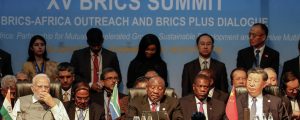Saudi Arabia and other oil producers are gradually diversifying away from the US dollar in their energy trade, a move that could eventually dethrone the “petrodollar” and undermine the US financial system, international political and economic analysts told Sputnik.

The Saudi Central Bank has joined the Bank for International Settlements’ (BIS) central bank digital currency (CBDC) project, mBridge, to enable instant cross-border payments.
Meanwhile, a so-called “petrodollar agreement” concluded between the US and Saudi Arabia in 1974, is said to have expired on June 9, 2024. Neither Washington nor Riyadh have confirmed the rumors so far.
The developments are seen as harbingers of a possible dollar demise in the global oil trade.
“These two significant developments serve one strategic purpose which is granting Saudi Arabia flexibility in its future dollar-based oil trade transactions,” Dr Mamdouh G. Salameh, an international oil economist and a global energy expert, told Sputnik.
“Put bluntly, it will enable Saudi Arabia to accept the petroyuan as payment for its oil exports to China without appearing to offend the United States. However, the damage to the petrodollar as the global oil currency since 1973 is incalculable particularly when all the Gulf Cooperation Council (GCC) countries follow suit as widely expected.”
Under a special deal, 50 years ago Riyadh got an opportunity to buy US treasuries bypassing the competitive bidding process. In exchange Saudi Arabia agreed to sell its oil in dollars and invest revenues into US debt; subsequently, Riyadh convinced other OPEC members to follow suit.
The “petrodollar deal” was struck several years after the Nixon administration ended the US dollar’s convertibility to gold, thus turning the Bretton Woods system into a fiat one. Earlier, in 1944, US partners agreed to peg their currencies to the dollar which, in turn, was fixed to gold. Under the US-Saudi deal, the greenback became “pegged” to oil.
24 August 2023, 11:45 GMT
Oil Producers and Their Customers Drifting Away From Dollar
According to some estimates, nearly 80 percent of global oil sales are priced in dollars. However, Russia, Iran, Saudi Arabia, China, and other countries are increasingly shifting to local currencies in energy trade.
In 2022, Saudi Arabia and China were reported to be in negotiations about settling part of their oil deals in yuans. In January 2023, Saudi Finance Minister Mohammed Al-Jadaan announced that the kingdom is open to using currencies other than the greenback in its energy trade.
“There are no issues with discussing how we settle our trade arrangements, whether it is in the US dollar, whether it is the euro, whether it is the Saudi riyal,” Al-Jadaan told Bloomberg TV on January 17, 2023. “I don’t think we are waving away or ruling out any discussion that will help improve trade around the world.

In November 2023, China and Saudi Arabia signed a $7 billion national currency swap deal to facilitate mutual economic cooperation, according to Bloomberg.
A month later, the Wall Street Journal reported that an estimated 20 percent of global oil deals were settled in currencies other than dollars in 2023. However, Salameh believes that the figure is poised to grow higher.
“With almost 12 million barrels of oil a day (mbd) exported by Saudi-led GCC countries to China and the Asia-Pacific region, China paying in petro-yuan for its crude imports of 13 mbd, Russia selling 8.5 mbd of crude and petroleum products in both ruble and petro-yuan and India paying in rupees for its imports of 5 mbd, this means that at least 52% of global oil trade [may be] sold in currencies other than the dollar,” the oil expert suggested.
“This will amount to a loss of an estimated 40% of the petrodollar share in global oil trade. It will seriously undermine both the US financial system and the dollar which could eventually lose one-third to one-half of its current value. One other serious factor behind the Saudi move is the worry about the health of the dollar,” Salameh noted.

By Ekaterina Blinova
Published by Sputnik Globe
Republished by The 21st Century
The views expressed in this article are solely those of the author and do not necessarily reflect the opinions of 21cir.com


